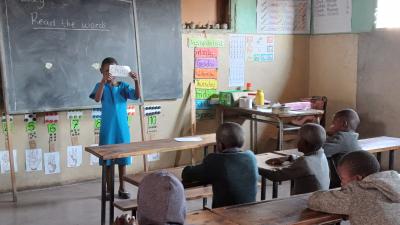Kentalis International Foundation continues its efforts to support deaf education in Zambia, building on previous projects to enhance teaching practices. In 2024, we introduced the Video Interaction Guidance (VIG) method, which focuses on improving teachers' communication skills by providing a feedback tool that uses video analysis.
Project: Teacher Assessment in Deaf Education - Introducing Video Interaction Guidance
In this project, Kentalis piloted the Video Interaction Guidance (VIG) method in Zambia as a tool for teacher feedback in deaf education. The method involves recording classroom interactions and using video analysis to help teachers reflect on and improve their communication and teaching techniques, particularly in their interactions with deaf students.
In our previous work in Zambia, we trained lecturers in the Reading Method for Early Literacy (RMEL) for learners who are deaf. The new VIG project complements these earlier efforts by providing a means for teachers to assess and refine how they apply the RMEL and other teaching approaches in the classroom.
Training and Teacher Development
In this project, Kentalis International Foundatioin trained educators in the VIG method during a one-week intensive course. This hands-on training allowed lecturers to practice video analysis and learn how to offer constructive feedback to teachers. The training aimed to enable teachers to identify successful teaching moments, improve their communication with deaf students, and apply effective classroom management strategies.
The long-term objective is for these lecturers to integrate the VIG method into regular teacher training and share their expertise with colleagues, ensuring broader dissemination of these innovative teaching tools, especially in the field of deaf education.

Project Facts:
- Timing: May 2024 – October 2024
- Location: Zambia: Lusaka, Mazabuka, and Choma
- Funded by: Vrienden van Effatha
- Partners: University of Zambia (UNZA), Kitwe College of Education, and Zambia Institute of Special Education (ZAMISE)